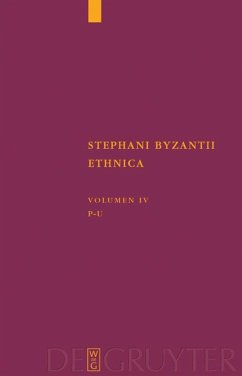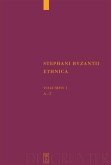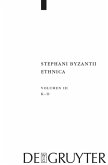This comprehensive geographical encyclopaedia, compiled around 530 A.D., catalogues some 3,600 names of places, mountains, lakes, rivers, waters and peoples from the ancient world. Particular attention is paid to the etymology of names and the grammatical derivations of the Ethnika . For cultural historical information â?? here with the evidence of the attributed quotations â?? Stephanos is often the sole source. This new critical edition replaces A. Meinekeâ??s long obsolete edition of 1849. The text of the directly recorded epitomes is accompanied by an apparatus of parallel terms which takes account of both the sources of the encyclopaedia and its later users. This first translation of the encyclopaedia in a modern language and the notes (particularly on language, onomastics and topography) open up the work to a wide circle of scholars engaged in studies of antiquity.
Die Neuausgabe von Stephanos von Byzanz, "Ethnika", entspricht einem langen Desiderat, ersetzt sie orientierten Siedlungsgeschichte des Mittelmeerraums und Kleinasiens machten eine Neukonzeption der Ausgabe unumgaenglich: Auf Rekonstruktionsversuche des urspruenglichen Lexikons wird verzichtet,
hingegen erlauben die Querverweise und die indirekte Ueberlieferung die verlorenen Artikel in den Buchstaben Kappa, Lambda, Omikron und Pi zu erschliessen. Beigegeben sind Similia, welche die Quellenbenutzung tragen. Die zahlreichen.Autorenzitate werden nachgewiesen, der griechische Originaltext
Die Neuausgabe von Stephanos von Byzanz, "Ethnika", entspricht einem langen Desiderat, ersetzt sie orientierten Siedlungsgeschichte des Mittelmeerraums und Kleinasiens machten eine Neukonzeption der Ausgabe unumgaenglich: Auf Rekonstruktionsversuche des urspruenglichen Lexikons wird verzichtet,
hingegen erlauben die Querverweise und die indirekte Ueberlieferung die verlorenen Artikel in den Buchstaben Kappa, Lambda, Omikron und Pi zu erschliessen. Beigegeben sind Similia, welche die Quellenbenutzung tragen. Die zahlreichen.Autorenzitate werden nachgewiesen, der griechische Originaltext







![[Tau ¿ Omega] [Tau ¿ Omega]](https://bilder.buecher.de/produkte/27/27819/27819313m.jpg)
